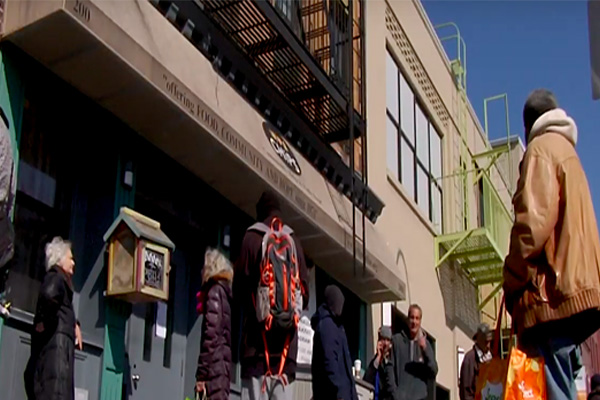
For nearly half a century, the Brooklyn-based soup kitchen, Community Help in Park Slope, Inc. (CHiPS) has served more than 300 daily meals to clients in the neighborhood without charging a dime. But, on March 19, it too succumbed to the coronavirus crisis, serving its last plate until further notice.
“With no volunteers, I can’t do it,” CHiPS Executive Director Denise Scaravella said. “I have to worry about them. I’m hoping to re-open April 1.”
On a day-to-day basis, Scaravella’s staff consists of just three full-time employees and five part-timers.
Everyone else who helps with the organization’s needs — from sorting food, toiletry and clothing donations, maintaining the long lines that wrap around the building, serving the hot meals, preparing the sandwiches for take-out, cleaning the tables, talking to clients – are mainly older, retired volunteers.
Scaravella cannot risk them getting infected.
Her small organization serves as a microcosm to the wider United States. Soup kitchens and other resources for the homeless are closing. The global pandemic is posing a stark threat to the poor, and the economic downturn may create a brand new wave of homelessness.
New York City, in particular, is already at a breaking point with more than 70,000 people with no place to call home. Homelessness was a crisis long before COVID-19 arrived in the city.
While Mayor Bill de Blasio and Governor Andrew Cuomo’s priority has been to close down shops and get New Yorkers to maintain a certain social distance, the city and state have yet to address the best way to house homeless people.
On March 18, clients wrapped outside the building waiting to pick up what would be, for some, their only meal for the day, and perhaps the last meal they will eat until they find an alternative to this neighborhood staple.
“CHiPS helps me eat all the time,” Jillian Eversley said as she picked up her last meal.
Silver Lining in Bedford-Stuyvesant
Nearly 4 miles east of CHiPS, the staff from another food pantry in Brooklyn are also deal-
ing with challenges regarding coronavirus. At St. John’s Bread & Life in Bedford-Stuyvesant, Director of Development Lindsay Gebhart said they have been proactive about the situation since mid-February.
“We talked about different scenarios and the first thing we did was order a ton of hand sanitizer,” Gebhart said.
By March 12, the Brooklyn food pantry took precautions even further. Volunteers were not allowed to help anymore. Staff were advised to be aggressive about their hygiene and social distancing.
“We closed down the dining room and started doing carry-out breakfast and lunch,” Gebhart said. “We limited the amount of people in the food pantry to seven people at a time and we made sure they were social distancing before they came in.”
For those seeking a free meal, they can still go to the food pantry located at 795 Lexington Avenue and pick out breakfast and lunch as a take-out meal. Guests, however, won’t be able to choose their groceries as they usually do. Instead, they’ll be offered an “emergency bag” which includes foods like dried beans, boxes of cereal, peanut butter and other items that have a long shelf life.
While the Bed-Stuy food pantry has a more robust facility with larger staff and is equipped with more technological advancements than CHiPS, allowing it to keep functioning, their missions are the same: to serve meals to hungry New Yorkers and be a safe haven for the vulnerable.
Yet, even with months of advanced planning, St. John’s Bread & Life is not immune to coronavirus effects on a grander scale.
Gebhart said they’re still unsure how the coronavirus will affect their main food pantry suppliers, which include City Harvest and other New York-based food pantry organizations. She added that they had to cancel their organization’s April dinner, an event that will slash their bottom line by at least 15 percent.
“We’re absolutely desperate for donations,” she said. “It allows us to purchase emergency food for our guests.”
